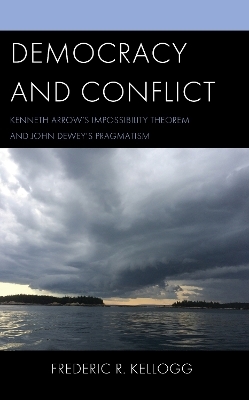
Democracy and Conflict
Kenneth Arrow's Impossibility Theorem and John Dewey's Pragmatism
Seiten
2023
Lexington Books (Verlag)
978-1-7936-5428-1 (ISBN)
Lexington Books (Verlag)
978-1-7936-5428-1 (ISBN)
This book develops John Dewey's broad conception of social conflict as a natural process of discovery and preference adjustment, resolving Kenneth Arrow’s famous theorem of the impossibility of ordering diverse preferences through voting. It addresses the nature and resolution of today's urgent problems and political polarization.
The economist Kenneth Arrow proved in 1951 that a society of diverse individual preferences could only by ordered by dictatorship. His impossibility theorem is still an axiom of contemporary welfare economics and has never been seriously challenged. The American philosopher John Dewey, who died in 1952, had claimed that voting and electoral mechanisms do not define democratic self-government. His broad conception of social conflict addresses preference diversity and resolves Arrow’s impossibility.
Since the 1980s, political scientists have focused on decision through democratic “deliberation.” Dewey saw that conversation alone is inadequate for resolution of conflicts in a democracy. Conflict is accompanied by discourse, but preferences are grounded in habits. Social habits resist adjustment in response to discourse alone, but demonstrably adjust in the process of conflict resolution, Preference conflict is distinguished from Marxist and later models, as a discovery and transformation process. It advances an original, updated theory of social conflict in a democracy relevant to today's problematic situations from discrimination to climate change and political polarization.
The economist Kenneth Arrow proved in 1951 that a society of diverse individual preferences could only by ordered by dictatorship. His impossibility theorem is still an axiom of contemporary welfare economics and has never been seriously challenged. The American philosopher John Dewey, who died in 1952, had claimed that voting and electoral mechanisms do not define democratic self-government. His broad conception of social conflict addresses preference diversity and resolves Arrow’s impossibility.
Since the 1980s, political scientists have focused on decision through democratic “deliberation.” Dewey saw that conversation alone is inadequate for resolution of conflicts in a democracy. Conflict is accompanied by discourse, but preferences are grounded in habits. Social habits resist adjustment in response to discourse alone, but demonstrably adjust in the process of conflict resolution, Preference conflict is distinguished from Marxist and later models, as a discovery and transformation process. It advances an original, updated theory of social conflict in a democracy relevant to today's problematic situations from discrimination to climate change and political polarization.
Frederic R. Kellogg is research scholar at The George Washington University and visiting professor at Universidad Federal de Pernambuco in Brazil.
Introduction
Chapter 1: Arrow’s Impossibility Theorem
Chapter 2: Dewey’s Agonistic Pragmatism
Chapter 3: Problematic Conflict and Transformation
Chapter 4: Dewey’s Naturalized Utilitarianism
Chapter 5: Agonistic Deliberation
Chapter 6: Uncertainty in Legal Theory
Chapter 7: Legal Principles
Chapter 8: Empirical Naturalism in Law
Chapter 9: Naturalizing Objectivity
Chapter 10: Dewey’s Democracy and Conflict
Bibliography
About the Author
| Erscheinungsdatum | 09.12.2023 |
|---|---|
| Verlagsort | Lanham, MD |
| Sprache | englisch |
| Maße | 158 x 239 mm |
| Gewicht | 467 g |
| Themenwelt | Geisteswissenschaften ► Philosophie |
| Recht / Steuern ► EU / Internationales Recht | |
| Recht / Steuern ► Öffentliches Recht ► Verfassungsrecht | |
| Sozialwissenschaften ► Politik / Verwaltung ► Politische Systeme | |
| Sozialwissenschaften ► Soziologie ► Allgemeines / Lexika | |
| ISBN-10 | 1-7936-5428-X / 179365428X |
| ISBN-13 | 978-1-7936-5428-1 / 9781793654281 |
| Zustand | Neuware |
| Informationen gemäß Produktsicherheitsverordnung (GPSR) | |
| Haben Sie eine Frage zum Produkt? |
Mehr entdecken
aus dem Bereich
aus dem Bereich


